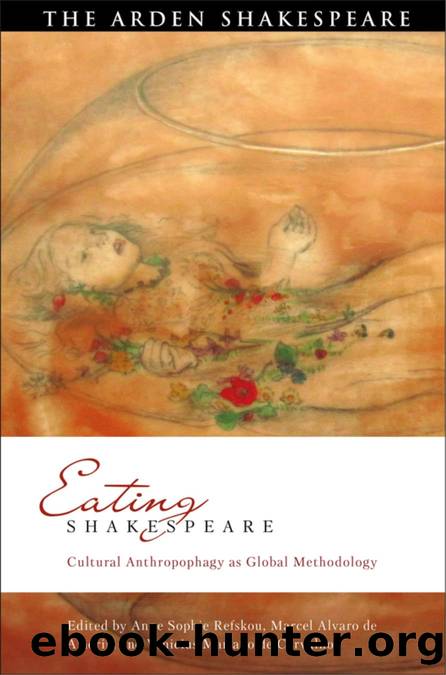Eating Shakespeare by Refskou Anne Sophie; Amorim Marcel Alvaro de; Carvalho Vinicius Mariano de

Author:Refskou, Anne Sophie; Amorim, Marcel Alvaro de; Carvalho, Vinicius Mariano de
Language: eng
Format: epub
Publisher: Bloomsbury Publishing Plc
Published: 2019-11-22T16:00:00+00:00
7
Past and present trajectories for âGlobal Shakespeareâ: Mark Thornton Burnett in conversation with Anne Sophie Refskou
ASR I would like to begin by addressing that âother wordâ in Global Shakespeare: âglobalâ. Although some scholars, such as Alexa Alice Joubin and yourself, have looked more closely at the implications of a âglobalâ rather than a âworldâ or âworldwideâ Shakespeare, it seems worth re-evaluating the nomination of the discipline (if we can call Global Shakespeare a discipline) at this point in its life-cycle. This would, among other things, mean asking you to what extent you feel that Global Shakespeare has critically addressed globalization and globalization theories. Not least in terms of economics and capitalism.
MTB To an extent I think scholarship related to âGlobal Shakespeareâ has addressed globalization in thinking about questions to do with economics, capitalism and the market, but there is much more work to be done on critically necessary issues here. It is very interesting how globalization impacts on culture because it can operate in so many different and sometimes contradictory ways. And I believe that sometimes there is an assumption that Shakespeare is a non-fluctuating barometer of cultural capital: that he works as a kind of constant. But if you drill down a little into the various examples, a much more diffuse picture emerges. As much as Shakespeare is seen as a passport to global visibility, he can also operate as box-office poison, as some critics and directors have claimed. To produce a global Shakespeare film, for example, does not necessarily mean guaranteeing yourself the limelight on the festival circuit or in cinemas and digital media. To give two different examples: Vishal Bhardwajâs films â the Shakespeare trilogy of Maqbool [2004], Omkara [2006] and Haider [2014] â now have their place assured in the Shakespearean film canon around the world. One needs to think about why that is. Is it to do with exposure? Is it to do with aesthetics and quality? Is it to do with Indian film industries and how these are plugged into other networks? And then there is such a film as An Athens Summer Nightâs Dream [dir. Dimitri Athanitis, 1999], which is a Greek adaptation of A Midsummer Nightâs Dream that seems to have vanished without a trace, at least as far as non-Greek circuits of communication are concerned. What this means is that whenever we are considering âGlobal Shakespeareâ we are dealing with an inevitably skewed and partial sample. And what that means in turn is that generalizations become difficult and complex: we always have to be careful and contextual, as a result. There are other questions, too. Who controls the circuits of visibility and invisibility, presence and non-presence, and why? All of this needs to be taken into account when we are thinking about the economic interstices of Shakespearean production.
That film â An Athens Summer Nightâs Dream â belongs to a different context and film culture, of course, but the point remains that globalization works multifariously and unpredictably in terms of Shakespeareâs capital. There are the beginnings of very good scholarly work on this.
Download
This site does not store any files on its server. We only index and link to content provided by other sites. Please contact the content providers to delete copyright contents if any and email us, we'll remove relevant links or contents immediately.
The Power of Myth by Joseph Campbell & Bill Moyers(925)
Half Moon Bay by Jonathan Kellerman & Jesse Kellerman(911)
A Social History of the Media by Peter Burke & Peter Burke(883)
Inseparable by Emma Donoghue(844)
The Nets of Modernism: Henry James, Virginia Woolf, James Joyce, and Sigmund Freud by Maud Ellmann(740)
The Spike by Mark Humphries;(719)
A Theory of Narrative Drawing by Simon Grennan(707)
The Complete Correspondence 1928-1940 by Theodor W. Adorno & Walter Benjamin(705)
Ideology by Eagleton Terry;(659)
Bodies from the Library 3 by Tony Medawar(649)
Culture by Terry Eagleton(646)
World Philology by(645)
Farnsworth's Classical English Rhetoric by Ward Farnsworth(641)
A Reader’s Companion to J. D. Salinger’s The Catcher in the Rye by Peter Beidler(614)
Adam Smith by Jonathan Conlin(608)
High Albania by M. Edith Durham(592)
Game of Thrones and Philosophy by William Irwin(592)
Comic Genius: Portraits of Funny People by(581)
Monkey King by Wu Cheng'en(577)
